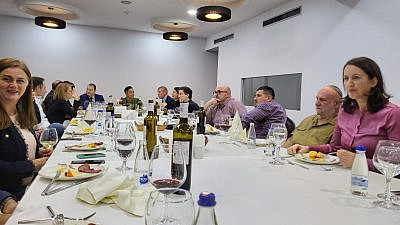It has been almost 15 years to the day since Kosovo, a landlocked country of 1.95 million north of Greece, declared independence on Feb. 17, 2008. Its Jewish community numbers just 35 to 50 people, but its leadership remains optimistic that Judaism can thrive in a nation that is almost 93% ethnic Albanian, with a Sunni Muslim majority and Christian minority.
“We live in harmony for the most part, and there isn’t much antisemitism,” Dr. Hysen Hyseni, a physician and chairman of the Jewish community, told JNS. “Jewish life will keep getting better.”
One of the world’s youngest countries, Kosovo, which is not part of the United Nations, declared independence following the breakup of Yugoslavia, after the fall of communism and a 1998-99 civil war. In September 2020, Israel became the 101st country to recognize Kosovo.
Kosovo opened an embassy in Jerusalem in 2021 and has the distinction of being the first Muslim-majority state to recognize Jerusalem as Israel’s capital.
Kaplan was assisted by the late Yisroel Finman, a rabbi who immigrated to Albania, in keeping the Jewish presence in the area running.
Ottoman censuses document a Jewish home in the area—in the city of Vučitrn—at least as far back as 1455. A large group of Sephardic Jews, who had been expelled from Spain and Portugal in the late 15th and early 16th centuries, arrived in Kosovo, and Jewish life has thrived since, albeit in small numbers of late.
Kosovo became an annexed part of the Italian protectorate of Albania (1939-43) during World War II, and some 200 of 500 Kosovo Jews were murdered in the Holocaust. The Italians turned those Jews over to the Nazis. Some died in the Germans’ Sajmište concentration camp in Yugoslavia, and others perished in Bergen-Belsen in northern Germany. Three Holocaust survivors from Kosovo are still alive today.

Kosovo’s Jewish community is adamant that Muslim Kosovars aided and hid Jews in this darkest hour. They cite continued good relationships between Kosovo’s Jewish and Muslim populations, as in Albania. Historically, Kosovo’s Jews spoke Ladino, but in recent years, they have switched to Albanian.
Under communism, Jewish life deteriorated in Yugoslavia. Pristina’s two synagogues were forced to close. The other cities aren’t known to have had shuls.
A Holocaust memorial now stands where a synagogue once did. Many historic buildings in Pristina’s old city bazaar, once home to vibrant Jewish life, were razed.
The 1998-99 Kosovo War was a difficult time for the country and its Jews, and it triggered mass emigration. When the U.S.-led NATO mission went to war with Yugoslavia, the conflict ended, with the latter forced to withdraw from Kosovo in 1999. The U.N. still does not recognize Kosovo, however.
In light of U.S. assistance in its struggle for independence, Kosovo is a very pro-America country. The capital features a statue of former President Bill Clinton and a street named for former President George W. Bush. Residents and tourists can see Fourth of July and Presidents’ Day parades in Kosovo.
Jews sought opportunities outside Kosovo, with many moving to Belgrade–then the Yugoslavian capital and now part of Serbia–while others moved to Israel, Latin America or the European Union.
Kosovo’s Jewish diaspora maintains “close ties” and visits often, according to Hyseni, who served as a doctor during the war in the 1990s and felt it was his duty to remain.
The 200-year-old Jewish cemetery that overlooks Pristina attests to the longstanding Jewish presence.
In June 2011, Dartmouth College and American University in Kosovo (RIT Kosovo) students undertook restorations of the tombstones, some of which have Ladino inscriptions. That same year, vandals defaced tombstones in the cemetery with swastikas and other antisemitic graffiti. Kosovo officials condemned the desecration and the culture ministry swiftly cleaned the stones.
Kaplan said, “I wish more would be done to preserve it. It is neglected and in a very vulnerable state.”
Kosovan Jewish activist Flori Zevi told JNS that many of the community’s Jews intermarried with ethnic Kosovar Albanians during the communist era. They were not able to keep their religious practices alive. “But they never forgot their Jewish roots and traditions,” he said.
With Kaplan at the helm, Kosovo’s Jewish community organizes gatherings on holidays and tries its best to keep Jewish life going.
“As the economy improves, I can only see Jewish life growing stronger,” he said.
“We hope to have a synagogue soon and also have Hebrew classes for our children,” Hyseni said. “The future for the community looks good.”


























